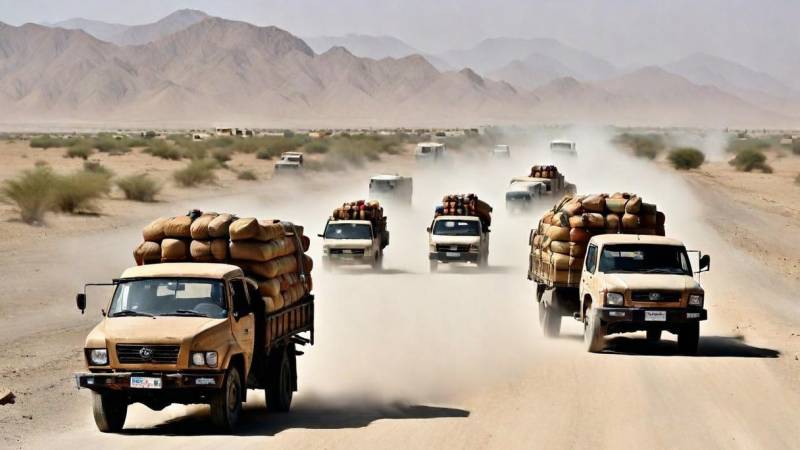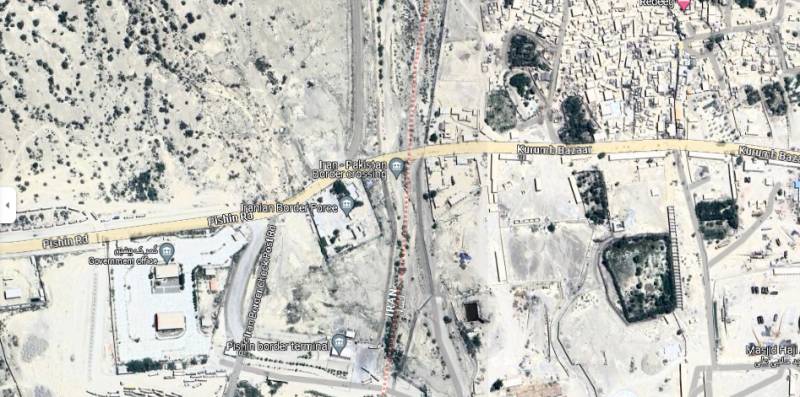
Every time trade at the border is disrupted, the velocity of money plunges in the western district of Kech. While sanctions and restrictive state policies seek to regulate trade with neighbouring Iran, few care about its profound impact on the daily lives of those living in Kech.
Kech is located in the Makran division of Balochistan. It has seven tehsils: Buleda, Zamuran, Turbat, Mand, Dasht, Tump, and Hoshab. Per the 2023 digital census, the city of Kech has a population of 1,060,931. Kech district is bound on the north by the Panjgur district, on the east by the desolate Awaran district, on the south by the coastal Gwadar district, and on the west by the border and Iran. Given its proximity to Iran, it is no surprise that Iran dominates its economic and social landscape.
A research article by South Asia Partnership Pakistan states that "hundreds of shops in the main markets of Bullo Mund, a city of Tump tehsil, sell Iranian goods from candies to refrigerators and carpets. Iranian motorcycles ply all over the district. Most of the district's fuel requirements are met by the Iranian oil. Besides this, food and vegetables are also imported."
Sources at the Kech district commissioner's office said some 15,000 to 16,000 registered vehicles are engaged in border trade and that it has a huge and direct impact on district Kech economically and socially. The economic impact can be determined by the fact that economic activities and circulation of money immediately grind to a halt whenever the border is disrupted — as has happened with growing frequency in the recent past. The social impacts are associated with the fact that there are many Balochs who cross over to Iran for better employment opportunities, while others share families in Sistan-Baluchistan on the Iranian side. Whenever trade comes to a standstill, unemployment hikes in Kech, giving rise to social evils such as theft, drug addiction and domestic violence.
Researcher Abdullah Raisani, who has extensively researched the trade between Iran and Pakistan and its impact on border areas, estimated in one of his articles titled "Trade with Iran", that "over a million Pakistanis directly, and almost the same number of Pakistanis indirectly, depend on border trade."
"It is easy to find Iranian beverages, petrol and diesel, cooking oil, sweets, snacks, and dairy products in more than half of Balochistan, even in the provincial capital Quetta, and especially contiguous Baloch areas in the province."
Impact on local businesses
Trade with Iran impacts most of Kech district. Waris Lal, the owner of a wholesale general store located in the main bazaar of Turbat tehsil, when asked about the impact of the border trade on his business, replied: "Our business, to a great extent, relies on the border. Disruptions in border trade greatly affect our margin of revenue in comparison to normal times. It is because a great number of people in the Kech district are involved in the border trade."
When asked about the consequences he faces as a businessman if trade stops on the border, he responded tellingly, "The wheels of my business might as well stop turning if the border trade stops because the money circulation will stop."

He added that in addition to his, lots of other businesses are impacted indirectly by the dint of border trade, such as fuel trucks. The business of motors/pumps has come into the spotlight with the flow of border trade because these motors/pumps are used to unload fuel from car tanks to fuel containers in depots. In a similar manner, automotive services and car repair shops also rely on border trade to a great extent. Some 600 cars are 'allowed' to cross the border daily to trade goods for fuel. Other than fuel, a huge number of cars cross the border to trade goods like cosmetics, vegetables, edible products, and a lot more. Since these cars require regular upkeep, it generates commerce and economic activity for those involved in the vehicle repair business, automotive services, car repair shops and auto shops.
Businesses in the Kech district rely on border trade with Iran to a great extent
Muhaziam Rind, a resident of the Mand tehsil in Kech, said he owns two auto shops, which are located in Turbat and Mand. When asked about the impact on his business due to the closure of the border, he answered, "a lot", and explained that auto shops rely greatly on vehicles involved in the border trade. Whenever the border trade is disturbed, their business also suffers, he said, adding that whenever the border trade flows smoothly, their business flourishes. He also mentioned that some products they use are directly sourced from Iran, such as Speedy Oil and Barrow Oil. He said that oils sourced from Iran are cheaper and of very good quality, which is why people in the area prefer them.
Improved life of people doing border trade
Taimoor Maqbool, a resident of Raeesabad in Tump tehsil, shared his story after being asked to comment on the border trade with Iran. He stated that he had started engaging in border trade in 2019. He brings fuel from Iran and sells it in Turbat, which has helped him enhance and stabilise his financial situation: within a short period, he was able to construct a house for his family. Maqbool said that the border trade was a great source of employment for the people of Kech. Whenever there are disruptions in the border trade, he, along with thousands of other families, face financial hardships.
Similarly, a youngster, Faraz Baloch, shared how the border trade was "the only source of income for our people." He continued, "The main bazaar of Turbat relies on the Iranian border trade. Despite having a Master of Arts degree, I still choose to engage in the business of trading fuel from Iran."
He added that the border trade has proven to be a substantial lifeline for many residents of the border district. "I am feeding my family through this business."
Economic analysis
In economics, the velocity of money is the rate at which money exchanges hands. In simple terms, if we suppose that the exchange of money completely stops in the country today, every business will stop as a consequence. That is because money circulation would have stopped. Therefore, border trade has a direct link to the money circulation in district Kech. Border trade accelerates the money circulation in the district; as a result, there is a high velocity of money when the border trade flows undisturbed. By dint of it, the businesses can generate better revenues. Economic activities rise with the flow of border trade in the district.
Despite the importance of border trade for this region of the country, the staggering number of restrictions, hurdles, and hindrances on border trade make it a highly risky business. This is least in part due to the policies in Islamabad and restrictions imposed further afield, like sanctions imposed on Iran.
Even though the people who spoke to [The Friday Times] noted how engaging in border trade had improved their financial situation, they still face huge fluctuations and little stability. For example, the local administration has reportedly set a limit on the number of cars allowed to cross the border at the two official crossing points: only 600 cars are allowed to cross the border to bring diesel and petrol from Iran each day. This meagre supply does not meet demand and, as a result, the price of petrol rises.
Border trade with Iran is directly linked to money circulation in district Kech
In conclusion, Iranian border trade directly and indirectly impacts every business and person in Kech. Free trade agreements can be a tool to improve bilateral trade. From classical economists like Adam Smith to the present day, economists favour free trade for accelerating economic activities.
There are ways to help enhance the regulation of Pakistan-Iran border trade. Advanced CCTV cameras and technologically well-equipped computer systems should be built to enhance trade and facilitate human capital movement across the border. Proper checks and balances and strict accountability will make it smoother for the people living on both sides of the border to trade bilaterally.

